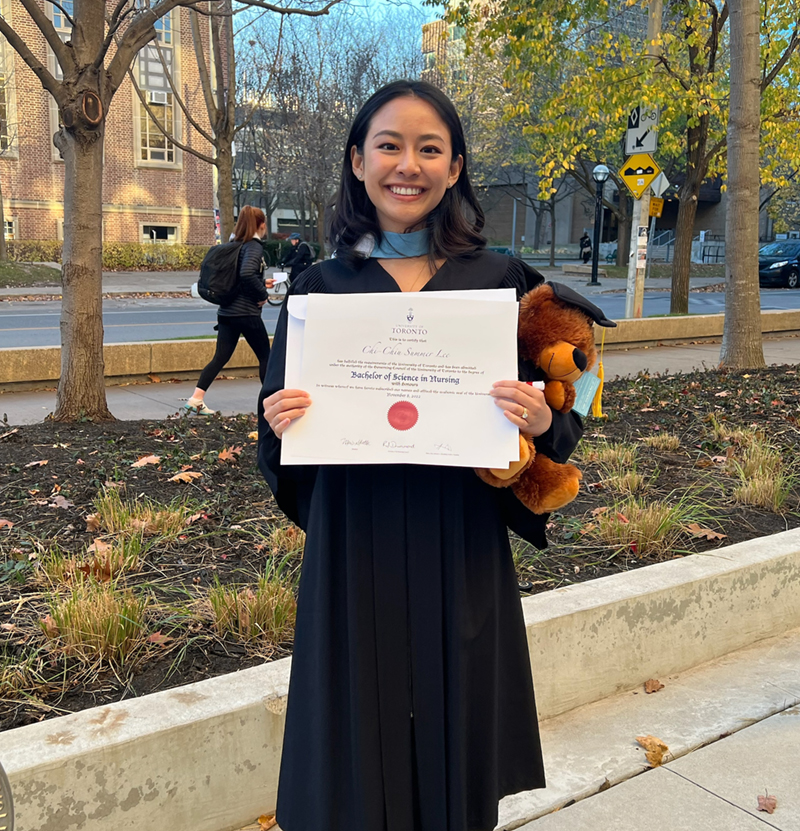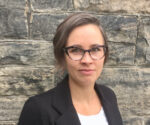Program Requirements
All BScN undergraduate courses are compulsory. Withdrawal from any course in the BScN Program requires special permission and will lengthen your time to completion beyond the typical 2 year timeline. Please contact student services for more information. Email: ask.nursing@utoronto.ca
Courses with clinical nursing practice
For those courses with a clinical nursing practice component, the evaluation of clinical performance is on a “PASS/FAIL” basis.
To pass the course, the student must pass both the clinical and classroom components. Normally students will receive a verbal mid-term evaluation and a written final evaluation of their clinical performance from their clinical instructor.
Students who are identified at the mid-term point as being at risk of failing clinical practice, will receive a written mid-term evaluation. Students whose performance is unsatisfactory at any time after the midpoint of the clinical experience, will also be informed in writing.
What to expect in the program
-
A full schedule of in-person classroom, simulation lab, and clinical learning with no electives
-
Scheduled classroom and lab learning takes place Monday through Friday
-
Scheduled clinical placements vary by course but overall will include 8- or 12-hour shifts Monday through to Sunday on day, evening, and/or night shifts.
Term One
- Emphasis on theory, research, and practice relevant to care of patients, families and communities.
- Clinical courses introduce students to nursing practice across range of practice environments for two client populations and their families: older persons and persons with mental disorders.
- Clinical practice takes place in hospital and residential care settings
Term Two
- Emphasis on pathophysiology and care of individuals experiencing acute illnesses that require hospitalization
- Clinical practice takes place in paediatric, adult medical-surgical, labour and delivery/post-partum settings.
- Introduction to theories and concepts guiding community health nursing in Canada and internationally.
Term One
- Course work focuses on health system, health policy, leadership, ethics, research and scholarship, theory and practice, and issues in medical microbiology.
- Students complete clinical course NUR460/461 integrating theory, research and clinical practice in relation to the complexity of coping with persistent illness OR Clinical course integrating theory, research and clinical practice in relation to primary health care
Term Two
- Students complete clinical course NUR460/461 integrating theory, research, and clinical practice in relation to the complexity of coping with persistent illness OR Clinical course integrating theory, research and clinical practice in relation to primary health care
- Final course prepares students for independent practice after graduation
Students complete an 11-week continuous integrative clinical practicum at the end of year 2. Placements will be chosen in collaboration with faculty in consideration of the student’s future career goals, strengths and challenges.
Courses
See yourself in our program

Anjelica Martinez
Summer nursing internship in Abu Dhabi provides unique opportunity to explore international nursing experience

Summer Lee
“We are all in this together” – Nursing grad aims to advocate for future nurses

Jinal Patel and Conor Chiasson
A chance to make a difference – New nursing students share inspiration for joining nursing profession
Latest Testimonials
As a student, my most memorable learning experience took place in a second-year class on reflexive nursing practice. Prior to taking this class, I was unaware of reflexive practice and […]

I chose to attend Bloomberg Nursing because of the number of clinical placements we complete and the access to GTA hospitals as placement options. This made the program stand out […]

Meet our top-tier faculty and instructors
Bloomberg Nursing prides itself on providing our students with expert faculty in the field of nursing innovation and science. You will learn directly from nurses and nurse practitioners with a variety of clinical backgrounds.

Zoraida DeCastro Beekhoo, RN, MA
Associate Professor, Teaching Stream
(Research and Study Leave July 1, 2024 – June 30, 2025)

Erica Cambly, RN, MN
Associate Professor, Teaching Stream

Charlene Chu, RN, PhD, GNC(C)
Assistant Professor

Laura Fairley, RN MN CHPCN(C)
Assistant Professor, Teaching Stream

Mary Ann Fegan, RN, MN
Associate Professor, Teaching Stream
Undergraduate Coordinator, Year 1

Quinn Grundy, RN, PhD
Assistant Professor

Lindsay Jibb, RN, PhD, CPHON
Assistant Professor
Signy Hildur Eaton Chair in Paediatric Nursing Research

Sarah Johnston, RN, MN
Assistant Professor, Teaching Stream
Undergraduate Coordinator, Year 2 (term)

Joanne Louis, NP, MN
Assistant Professor, Teaching Stream

Shan Mohammed, RN, MN, PhD
Associate Professor, Teaching Stream
Director, MN Program

Heather Thomson, RN, MN, PhD
Assistant Professor, Teaching Stream
Director, Undergraduate Program
Jean Wilson
Assistant Professor, Teaching Stream
Related Programs
Graduate
Master of Nursing
Our Master of Nursing program prepares nurses to be professional leaders in their chosen advanced practice field.
Graduate
Post-Master Nurse Practitioner Diploma
A program designed for nurses who have completed a Master’s degree, preparing them for NP roles.
Graduate
Collaborative Specializations for Master’s and Doctoral Students
Providing a multidisciplinary experience that enhances student expertise in their chosen graduate degree.
Graduate
Doctor of Philosophy
Building leaders in nursing science. The PhD program prepares scholars to lead the way in innovative health care policy, practice, and research.
Graduate
Doctor of Nursing
Thesis-based program. Students learn to identify and investigate a challenge in healthcare or nursing education and design implementation and evidence-based strategies to improve outcomes.